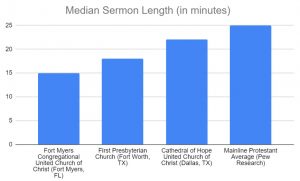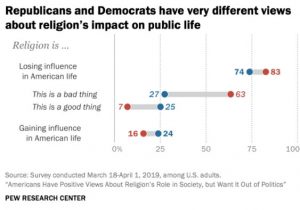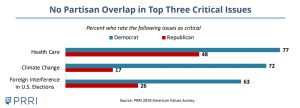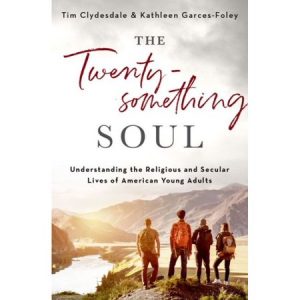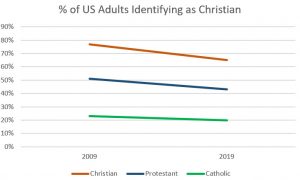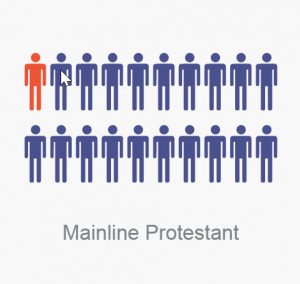How long should a sermon be? In my experience the number of answers to this question are equal to or even greater than the number of people participating in the conversation. How long are sermons preached in America? According to a Pew Research Center analysis of nearly 50,000 sermons preached earlier this year (2019) the median sermon length of American congregations is 37 minutes. This number, however, varies widely based on the tradition of a given house Read More …
Trends
Religion is Losing Influence (#1836)
A new survey conducted by Pew Research Center shows that Republicans and Democrats strongly agree that religion is losing influence in American life. In an era where Republicans and those who lean Republican tend to disagree with Democrats and those who lean Democrat on nearly every issue (e.g, check out Partisan Polarization - 3 Critical Issues) it is interesting how much support there is in both groups for the statement that religion is losing influence in American life (Democrat/Lean Read More …
Partisan Polarization – 3 Critical Issues (#1834)
PRRI recently released a report titled "Fractured Nation: Widening Partisan Polarization and Key Issues in 2020 Presidential Elections" that presents key data from the 2019 American Values Survey. The following image shows just how wide the partisan gap is for the top three critical issues. White Christians A religious divide also exists. While 42% of Americans self-identify as white Christians, the survey found 69% of Republicans compared to 30% of Democrats self-identify as Read More …
Young Adults Projected to Decline Rapidly in the Mainline (#1833)
One of the books I've read recently that I know I'll return to many times in the years to come is The Twentysomething Soul: Understanding the Religious and Secular Lives of American Young Adults (Oxford University Press, 2019) by Tim Clydesdale and Kathleen Garces-Foley. This comprehensive appraisal of the contemporary experience of twentysomethings offers unparalleled insight into the religious experience of this age group in the United States. The Good News To help readers Read More …
A Decade of Rapid Decline in American Christianity (#1831)
Earlier this week the Pew Research Center published an update on America's changing religious landscape titled In U.S., Decline of Christianity Continues at Rapid Pace. Rapid Decline The following statistics from this new report showcase just how rapidly Christianity has declined in America over the last decade 12% fewer Americans identify as Christian (down from 77% to 65%)8% fewer Americans identify as Protestant (down from 51% to 43%)3% fewer Americans identify as Catholic (down Read More …
Farewell to White Protestant Texas (#1824)
Demographic shifts are happening more rapidly than many realize. In a 2014 post titled "End of the White Majority," I shared that the National Center for Education Statistics projected that after years of decline white non-Hispanic students would no longer be the majority in the public schools in the United States.In a 2016 post titled "Farewell to White Protestant America" I shared some of the findings presented by Robert P. Jones in his then recently published book: The End of White Read More …
Another Decade of Major Decline in The Episcopal Church (#1823)
Earlier this week Episcopal priest Tom Ferguson wrote a piece titled "The Collapse is Here," exploring The Episcopal Church's recently published statistics on Sunday worship attendance from 2008 to 2018. Ferguson offers several high level observations about what has happened and what the Episcopal Church looks like today: Average attendance dropped 25% (24.7%) between 2008 and 2018. Average attendance in 2018 was 562,529.There are now more parishes with an average attendance of less than 10 Read More …
Are 10,000 Churches Closing Every Year? (#1822)
For years, I've heard people claim that 10,000 churches are closing every year in America. A quick web search shows that this big, bold, round number can be found on its own or, more often, as the high end of a range on dozens of websites. These sites include pieces by largely unknown bloggers alongside articles by those many consider to be authorities in field. For example, last year Thom Rainer - a leading Evaneglical voice and the former president and CEO of LifeWay Christian Resources - Read More …
Mainline: The 5 Percent? (#1819)
Over the years I've written dozens of blog posts about Mainline decline. This morning, I happened upon a tweet that highlights the significance in decline by comparing current Mainline Protestant affiliation rates for those over age 65 with those under age 35. Ryan Burge, Assistant Professor of Political Science at Eastern Illinois University, tweeted "4.5% of those under 35 are mainline Prot. vs. 20.6% of those 65+." So What? Put differently: For every 20 Americans over age Read More …
What Americans Don’t Know About Religion (#1817)
Over the last decade I taught an undergraduate introduction to world religions course more than two dozen times. From that experience, I learned the importance of having students self-assess their religious literacy during the first week of the semester in order to help them recognize just how much they did not know. Reflecting on these ungraded assignments, students often remarked that the exercise revealed that while they performed okay on questions about their own religion or the religion Read More …
